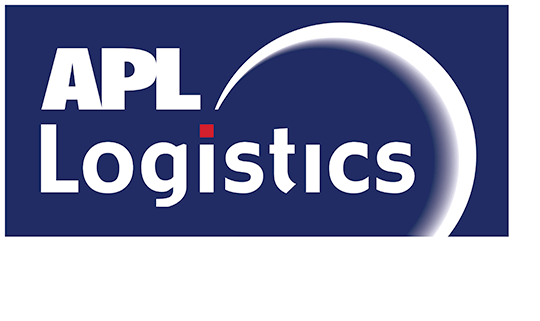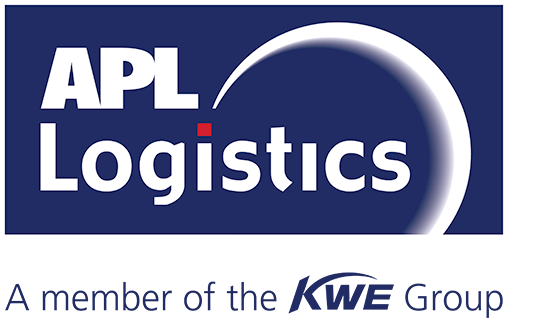June 16, 2025 in Podcast
EMEA Challenges and Trends in the Supply Chain Industry
April Chapman:
Hello everyone and welcome to the APLL Pulse podcast, where you can uncover new insights from the logistics and freight forwarding industry through the seasoned experts at APL Logistics, a global supply chain provider. We’ll help you keep pace with the current topics impacting businesses and advance your logistics strategy.
Well, hello, everyone. I’m your host, April Chapman. Today, we have the privilege of speaking with Kim Overman, our Regional Vice President over EMEA, which includes Europe, the Middle East and Africa. So Kim joined APLL Logistics about two years ago and is based in the UK. He has retained a passion for customers throughout his career and was fortunate enough to work in China and Hong Kong for over 13 years, returning to Europe in 2020. This experience has enabled Kim to deepen his knowledge and understanding of the global logistics industry, with a particular interest in international inbound supply chain management and driving benefits that create impact and value for his customers. So Kim, thank you so much for joining us today.
Kim Overman:
Thank you so much, April for inviting me. Much appreciated.
April Chapman:
Alright, let’s jump right in. I want to give our listeners an overview of the EMEA market, for us. So can you let them know what is our current footprint in EMEA?
Kim Overman:
Yeah, sure. APL Logistics and EMEA has really been focused on our sort of core consumer markets, which are the UK, Germany, and the Netherlands. By doing that, we’ve been able to focus on giving our customers a really best-in-class inbound supply chain management service. Those customers typically are in the retail and lifestyle vertical, which is our focus area. In addition to that though, we also have our Turkey office, which is providing, I would say more export orientated services, both into the Americas, but also into Asia. I think the exciting thing for us at the moment, April, is though that we’re expanding all those dimensions. By saying that, I mean that one, we’re increasing our number of countries that we operate in. Two, we’re increasing our vertical focus. We’ve selected automotive as the focus area that we take there. And the third is customs, where we are close to releasing our new regional customs solution. That’s where we are shaping our business for the future.
April Chapman:
Well, what about France? I heard that we are expanding in there. Is that right?
Kim Overman:
Oh, sorry. Yes, we opened France earlier this year.
April Chapman:
Well, Kim, I’d love your take on this one. So the global market has been experiencing a heavy amount of disruption due to changing tariffs. So can you give us some insight into how they’re impacting EMEA specifically?
Kim Overman:
We’ve had some news this morning certainly hear that China-U.S. trade talks are progressing positively, so that’s great to hear. I think in reality then we are quite lucky, EMEA, that we have been less impacted than the Asia to US trade line. We’re still receiving bookings. We’re still facilitating a moving freight for our customers. I think we did a customer survey a few weeks back, and I think one of the main observations from customers was take a wait and see approach, but meantime continue flowing goods. And I think that’s what we’ve seen. So I’d like to think in Europe, we’ve been less impacted than other global markets. And what are we doing about that? We’ve got our global trade management teams who are plugging into news channels, information sources and feeding that back into our customers so we can give them the best updates,
April Chapman:
Right. Just got to stay on top of it.
Kim Overman:
Stay on top of it, product is flowing. That’s maybe something that people didn’t expect to hear, but product is definitely still flowing.
April Chapman:
That’s good news. So what are some of the specific challenges that are unique or that you guys face in EMEA? Can you share that with our audience?
Kim Overman:
Yeah, what I’d maybe like to try and do there is just relate that to the critical path of the purchase order, which is our primary solution for our customers. And there’s probably three pillars to that. One is the origin side, one is the actual in transit flow and the other is the destination. I think on the origin side, that the, the challenges that we face are in relation to … Because of the trade impact or the tariff impact, rather than there are canceled orders that are impacting shippers particularly in China, that provides disruption to our customers. There’s some container availability issues that we also see, because of the container network is disrupted. And then blank sailings as well are interrupting that origin flow.
April Chapman:
Well, can you tell our listeners what is a blank sailing?
Kim Overman:
Sure, blank sailing is when ocean carriers defined the loop of their service. And because of disruptions to that transit service, then sometimes, they will decide not to call at one of their published ports. When they decide to not call it that port. Basically they define that as a blank sailing. So, for example, they might avoid Ningbo or Shanghai on one of their loops and one of those ports would become a blank sailing. That typically happens quite late in the planning stage. So that can be where already, our customers have planned shipments from that port on that particular vessel. In short notice, that vessel will not call at that port.
April Chapman:
That makes sense. Okay. Alright, so you said origin was one of the first and that’s what you’re talking about. And you said there’s two others.
Kim Overman:
Yep. On the water. So in transit, I think the biggest issue here is one of the key things we’ve been seeing over the last couple of years, is the focus on the ETA of a vessel. So we provide predictive analysis to our customers on estimated times of arrival for vessels. Because of that extended transit time, avoiding the Red Sea now, obviously we can’t use that service. What we are finding is that a combination of that extended transit time and the disruption in the destination ports of North Europe. Then we are not able to provide that predictive detail that we’ve been able to do in the past. Quite short notice, again. Again, then those vessels will change their ports of arrival.
So instead of going in Rotterdam, they’ll end up in Antwerp. Also, there’s delays around those ports in terms of the time it takes to unload those container vessels. There was some news this morning also from the CEO of Hapag-Lloyd sharing some frustration over the delays that in the port of Rotterdam and the impact that’s having on their vessel reliability. The other one at destination is the terminal performance. So even when they do get into Rotterdam Port or Port of Felixstowe, then the actual terminal operations are not as effective as they were previously. And also we find that disrupts our multimodal services that we’re providing delivery options to our customers. Overall, there’s a continuity, if you like, of disruption. And that’s where we need to be agile. We need to be able to find solutions for our customers to maintain the predictability of their service.
April Chapman:
I like how you said that, continuity of disruption. That is so true.
Kim Overman:
Not stopping anytime soon.
April Chapman:
That’s right. That’s why we have to be prepared for solutions. Because you never know where that problem’s going to start, where it’s going to be. So let’s talk about some of those then. So can you give us any examples of how we have helped solve one of those specific challenges for a customer?
Kim Overman:
We’ve been developing in APL Logistics our OrderPilot application. OrderPilot is a platform that allows us to validate how POs are planned to ship. The volume they ship in, the scenarios around arrival times as we talked about predictive arrival times. And basically, that allows us to really define, not optimize flow for the customer. What we are able to do with OrderPilot is … The one example I’d like to share is we have a home improvement retailer in the Netherlands.
All their product needs to flow through their distribution center network. And what we can do with OrderPilot is actually plan a route to market that avoids the distribution network. By going through the distribution network, it adds cost, it adds lead time, and of course it also has an impact on their carbon footprint. By deploying OrderPilot as a planning tool, we’re able to identify the purchase orders, which can go in a dedicated container, direct to one of their multiple retail stores. The benefit of doing that allows us to reduce the operating costs, reduce the lead time of the shipment, and positively impact their carbon footprint by reducing emissions on their transport solutions. The benefit of the direct-to-store also improves availability on shelf, so that improves their sales opportunities.
April Chapman:
Right. Well, Kim. I know you have the opportunity to hear from customers as well as other industry leaders. So I’m really interested to know what you are seeing as emerging focuses for them right now.
Kim Overman:
This is an active conference season. I think it’s fair to say certainly in Europe anyway and myself and some of our colleagues have been fortunate enough to attend a number of those events in the last few weeks. I think the theme of resilience continues to probably be the dominant factor. We’re seeing some evolution of that now, so although resilience has been the primary focus for us to solve problems and disruptions over the last three, four years, we’ve probably been given a bit of a grace period to be able to do that, without a hundred percent focus on performance. I think what we’re now seeing is that customers are no longer accepting a grace period of those disruptions. They expect us as at 3PL to solve those issues and deliver to the service level agreements we have.
So that performance has become the number one topic, on top of resilience for us. We’ve responded, I think, thereby investing in our operational excellence, and I think we can see the benefits of that. I think in ’25 already, 2025 already, we can see that we’ve had a number of awards as the Origin Cargo Manager of the Year for three of our key customers, Nike, Home Depot, and Five Below, where despite them having a multi-3PL solution model, then they’ve identified APL Logistics as the best performing 3PL in their market. Very proud of that.
April Chapman:
Yes, yes.
Kim Overman:
A couple of those awards are back to back. So we’ve done that a couple of years on the bounce, which is fantastic. And I think what that does, it builds that foundation of operational resilience that the customer can then focus their resources on optimizing their supply chain and delivering the value to their businesses.
April Chapman:
Right. No, I think that those are wonderful. I think they’re very encouraging too. Because obviously, we put in a lot of work and it’s great to see the benefits of that labor. So that’s exciting. What is another area that you’re hearing about?
Kim Overman:
COVID has driven a way of contracting in the multi-year ocean deals that many customers committed to and also many customers bundled their Origin Cargo Management service, order management service with their ocean partners. Really, the benefit there of doing that was to secure capacity and enable them to link the management of their flow together with their ocean provider, ocean carrier. What we’re seeing now, though, is a little bit related to that performance issue, is that those same customers are looking to decouple those two primary services. So looking to decouple contracting with their ocean carriers and looking to decouple with their order management providers. The reason for that is that they’re now striving for best in class in both categories. For us, we see that as a huge benefit for APL Logistics. It allows us to really focus on our neutral position in the marketplace, as an origin cargo manager.
And it allows us to also provide a neutral service in the way that we manage the carriers that have been selected by our customers. This trend is really manifesting itself in the way that a number of RFQs, so Requests For Quotes, being issued by our customers through their procurement teams. We see that trend continuing for the rest of 2025 as we look at the anniversary of a number of contracts are coming due in the coming months. We see that advantageous for customers because really where they’re going to see that best-in-class selection of providers for ocean services and order management services.
April Chapman:
So you have a really positive view of what’s to come in our industry for EMEA going forward. Is that what I’m hearing?
Kim Overman:
Yeah, totally. I think we are into a real growth phase as a business. That’s in terms of the export business that we’re managing. So we have our export control tower in Turkey, which is part of providing a regional solution to service customers to the Americas, as I mentioned earlier, and also to Asia. And then on the inbound flow, I think the shift in buying behavior from our customers is playing into our sweet spot, into our strengths. For that reason, I am super optimistic and I’m looking forward to some more wins in ’25 and what we can achieve in ’26.
April Chapman:
That’s right, and I think another one of our strengths is that we have you, Kim. Your deep industry knowledge and we are just so thankful for you. So thank you, Kim, for joining us today and sharing all your insights with us. And for everyone out there, make sure to join us next time on the APLL Pulse podcast.
Thanks for joining us today. If you like what you heard or if you have any questions about today’s episode, reach out to us at Global_Marketing@APLLogistics.com. Make sure to subscribe to us on your favorite podcast apps. You’ll also find us on LinkedIn or visit us at APLLogistics.com. We’ll see you next time on the APLL Pulse podcast.
Thanks for joining us today. If you like what you heard or if you have any questions about today’s episode, reach out to us at global_marketing@apllogistics.com. Make sure to subscribe to us on your favorite podcast apps. You’ll also find us on LinkedIn or visit us @apllogistics.com. We’ll see you next time on the APLL Pulse Podcast.


